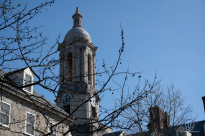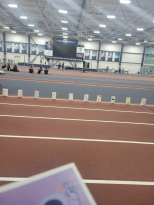Chinese students visit Penn State to report election
President Barack Obama and challenger Mitt Romney have become all too familiar for most Americans lately. Political ads have been splashed across TV screens, blue and red signs supporting candidates have been staked into front lawns and Twitter feeds have exploded during controversial, televised debates.
However, a group of visiting international students to State College this week were getting their first look at the election during its dwindling days.
Penn State welcomed 17 international students and three faculty members from Shanghai International Studies University (SISU) this week as they gained a unique perspective on the U.S. presidential election.

The students had a chance to attend various classes, network with local people and travel to major cities on the east coast during the last days of Romney and Obama's campaigns and the beginning of voting.
Although many of the students came to America with expectations about what the election would be like, they were happily surprised with what they found and are eager to take what they have learned back home to China.
"Americans care more about the election than the Chinese do," said Yi Xu, a senior majoring in advertising. "[Americans] care about the next four years and who will lead it."
In a conference room of the State College Municipal Building Saturday morning, just three days before Election Day, the Chinese students watched Borough Manager Tom Fountaine as he and two Centre County commissioners conducted an election briefing.
Slides above Fountaine highlighted the basics of government, elections and the voting process. Centre County commissioners Steve Dershem Michael Pipe zeroed in on local elections and voting in Centre County.
The students had plenty of questions, ranging from what the role of government really is and how everyone can get the opportunity to vote after natural disasters, like Hurricane Sandy.
They recorded the speakers, either pressing record on a camera or hurriedly taking down quotes on a notepad to gather material to post on a website for their university in Shanghai, China. This was not something they were used to doing before coming on the trip.
"They were timid and now they're brave," said Professor Zhu Ye in reference to the students reporting in another country.
Ye, Deputy Dean and associate professor of the College of Media and Communications at SISU, said the students have been presented with a unique opportunity here to combine all the journalism classes they've taken at school and apply them in another country.
Ye said the main purpose of putting the trip together for the Chinese students was to allow them to experience first-hand how to report internationally. He wants the students to learn how to communicate better in a foreign country and understand how this nation operates differently than their own, and also be able to communicate that back home.
"We hope to have more cooperation and exchange between [China and America] and take away the misunderstandings," Ye said.
Before arriving at Penn State on Oct. 31, the students visited Washington D.C. for a few days.
Schichao Weng, a senior majoring in education technology, said he interviewed local residents at popular monuments and tourist spots. At the end of the day, Weng and the rest of the students went back to their hotel room to write a story that night for the website.
Weng was impressed how people in the U.S. view the election so positively and take such a proactive role compared to in China.
Several of the other students agreed with Weng and have noticed the same things. Li Ziaoqing, also a senior majoring in educational technology, said the reality of the election in America certainly did not meet her expectations.
"I was surprised that volunteers play such a big role, like letting you know when the election is and encouraging others to vote," Ziaoqing said.
Ziaoqing enjoyed being on a college campus to see how young people are so involved in the election because it is not something she is used to seeing in China.
"Students in China can't play as big of a part as students here can," Ziaoqing said. "In China, students pay more attention to the academics and not much outside of that."
While at Penn State, the Chinese students were able to attend various journalism classes, take a tour of the campus, as well as the Daily Collegian office downtown, and will watch the election returns on Tuesday night in the Carnegie Building. On Friday, the students also took a day trip to Philadelphia.
They have been able to observe a lot of interactions between supporters of different parties and talk with them about how they are participating in the election, whether it be just voting or voicing their opinions.
"I was surprised you can voice your opinion and still all be friends, whoever you support, whether it be Obama or Romney," Ziaoqing said.
Ye, who is overseeing the trip along with two faculty members, said they all have been very appreciative of the American hospitality during their visit.
Several Penn State students in the International Reporting course, COMM 402, are already gearing up for a similar overseas trip to China during Spring Break that will be headed by Professor Tony Barbieri.
"The course started [in 2009] to give students experience reporting in an environment that they are not comfortable in," he said.
The class provides a good opportunity for students who may not be able to study abroad, Barbieri said, because the College of Communications subsidizes some of the trip's cost for all students.
Students enrolled in the class during 2010 were able to go to China and it helped to develop a relationship between the two universities, Barbieri said, that allowed for this year's trip from China to happen.
Barbieri hopes that this year's Chinese students will get the same experience his own students get in his class, which is being able to cover a story in a foreign environment.
But any anxiety the visiting Chinese students may have been feeling in a foreign country was not evident during their visit. They weren't afraid to point cameras at interviewees or ask probing questions to learn everything they could while in the U.S. observing the election.
Their curiosity ranged from questions about voter identification, and comparisons between Obama's campaign in 2008 and now after being president for four years.
"[The students] try to report from the Chinese perspective," Ye said. "They are on the outside and [the election] has nothing to do with them, but they want to understand [Americans] better."







